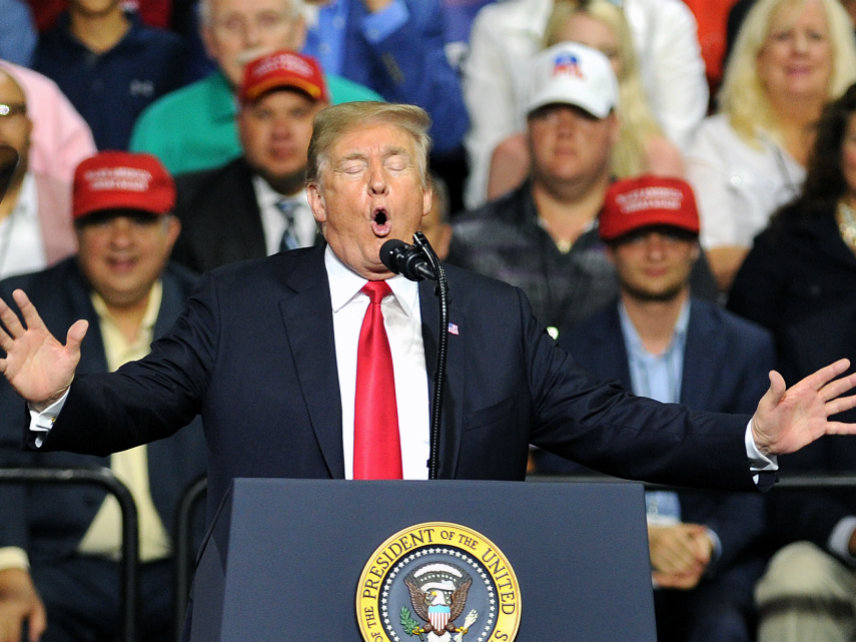Trump's Grocery Store Gaffe Matters, but Not for the Reason You Think
Yes, Trump is out of touch with regular life. All presidents are. This one's ignorance is a problem in other ways.

Donald Trump is basically gaffe-proof. But that doesn't mean his factual flubs have nothing to tell us about the man or his policies.
Take what happened in Tampa Tuesday night. Speaking at a rally, the president freewheeled into a rant about the need for Voter ID laws. This is a pretty mainstream Republican idea. Long before Trump was the party's figurehead, GOP politicians were rattling off the same talking point that Trump hit last night: You have to show ID to buy booze or smokes, you have to show ID before you can board a plane, so why shouldn't you have to show ID before entering the Holy of Holies of American democracy, the voting booth?
But Trump added something new to the mix. "You know, if you go out and you want to buy groceries, you need a picture on a card, you need ID," he said. "You go out and you want to buy anything, you need ID and you need your picture."
To clarify: You do not have to show a photo ID before buying bread, eggs, and milk at the local Kroger.
The media jumped on the gaffe, because it was funny and because it made him seem out of touch. But in the same speech Trump said something just as stupid and far more consequential, and it got much less attention. Dismissing worries about his tariffs, Trump claimed that farmers have reacted to China's retaliatory trade barriers by saying "it's OK, we can take it."
In fact, farmers tend to be pretty unhappy about being caught in the middle of Trump's trade war. In Iowa alone, the tit-for-tat tariffs with China could cost them more than $600 million this year, according to an Iowa State study. Farmers and their representatives have been some of the loudest voices opposing Trump's barriers to trade.
Most people in the White House know this. Presumably the president does too. That's why he's sending $12 billion in aid to farmers hurt by the tariffs, an effort that hasn't necessarily won many of them over. "Imagine someone destroys your car and then says I'll give you a ride to the next place you need to go. Well gee, thanks," farmer Mike Petefish told the Minneapolis Star-Tribune last week.
Trump and his top economic advisers continue to be brush off the consequences of his trade war. The president has told supporters not to believe stories about steel-consuming businesses having to lay off workers or close their doors, and Commerce Secretary Wilbur Ross has claimed that job losses and higher prices are merely "hiccups along the way."
But Trump has seemed genuinely stupified by the reaction. After being told by Sen. Jerry Moran (R-Kan.) that farmers "want markets, and not really a payment from the government," the president expressed surprise. "I've never heard of anybody who didn't want a payment from the government," he said, according to an account Moran gave to the Associated Press. That's way more worrying that Trump's peculiar ideas about buying groceries.
I'm not sure many of Trump's supporters will really care about his grocery gaffe. Where most politicians try to fake being a regular guy, Trump happily flaunts the extent to which he isn't like everyone else. He puts his name on the side of huge buildings, rides golden escalators to press conferences, and brags about having never changed a diaper. Almost everything about his personal brand suggests that yes, he's completely out of touch. That's been true for years. It hasn't held him back so far.
Almost anyone who has been successful in national politics is out of touch with regular life. When Hillary Clinton admitted in 2014 that she hadn't driven a car since 1996, it was treated as a major gaffe. But she was just being honest. You can't go grocery shopping or pick up your dry cleaning when you're constantly in a motorcade.
It's not ultimately very important that politicians can quote the price of milk—a classic "gotcha" question, particularly in Britain. But understanding how their policies affect the people who do have to go to the grocery store every week: That's important.

Show Comments (152)